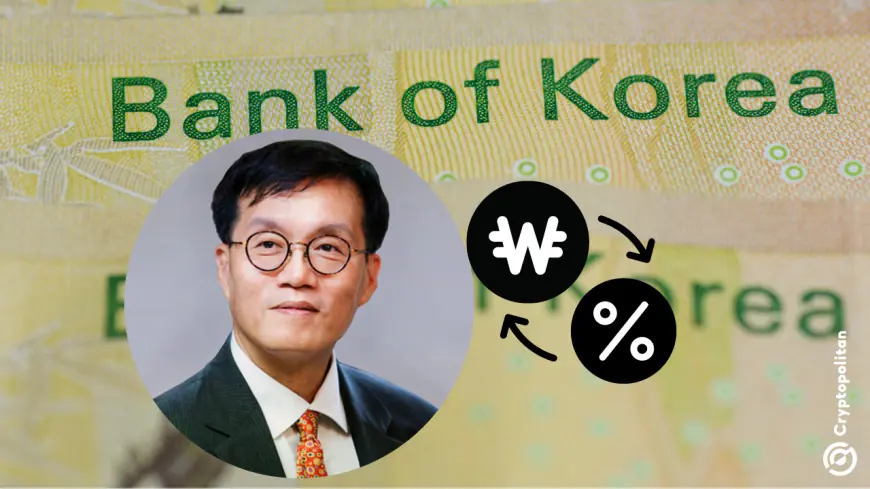Bank of Korea Governor says interest rate cuts unlikely after unprecedented political unrest
Bank of Korea Governor Rhee Chang-yong believes the central bank is unlikely to lower interest rates because of the country’s recent political turmoil. He said the chaos caused by President Yoon Suk Yeol’s move to impose martial law on the country had little implications for South Korea’s economy. In an interview on Bloomberg TV, Rhee […]

Bank of Korea Governor Rhee Chang-yong believes the central bank is unlikely to lower interest rates because of the country’s recent political turmoil. He said the chaos caused by President Yoon Suk Yeol’s move to impose martial law on the country had little implications for South Korea’s economy.
In an interview on Bloomberg TV, Rhee Chang-yong stated that the political event was “short-lived ” and that he didn’t see it as reason enough to change South Korea’s economic stance.
“I think we can focus on the economy’s strengths and the weaknesses of the economy rather than political side effects,” Chang-yong remarked.
His comments come after the South Korean parliament voted against President Yoon’s “premature” decison to declare martial law. Following Yoon’s announcement, the local currency and crypto markets plummeted to record lows, which the frenzy of mass liquidations and losses sending both local and foreign investors into a tailspin.
Rate cut hopes rise as South Koreans call for Presidential impeachment
President Yoon Suk Yeol’s decision to issue an emergency decree declaring martial law in South Korea quickly sparked intense political backlash. The majority of the country’s lawmakers, including members from Yoon’s own political party, saw his move as an overreach of executive power and nullified the declaration.
Now, six opposition parties, with the support of residents, have reportedly united to formulate a motion for President Yoon’s impeachment. Analysts believe Yoon’s actions represent increasing risks as geopolitical tensions rise and global trade uncertainties loom.
However, Governor Rhee Chang-yong expressed confidence that the country’s economic fundamentals are strong enough to weather the storm.
“Economic dynamics in Korea can be separated from the political dynamics, given our strong market fundamentals and the mature democracy,” Rhee told Bloomberg.
Governor Rhee acknowledged that the economic outlook is clouded by external factors, particularly the trade uncertainties accompanying President Trump’s return. That said, he emphasized that South Korea’s well-trained government officials have the tools necessary to navigate the current crisis, even though the exact path forward remains uncertain.
As reported by Reuters, the Bank of Korea delivered an interest rate cut to 3.00% towards the end of November, marking the second consecutive reduction in as many meetings. While only four out of 38 economists polled by Reuters had predicted this rate cut, the bank’s seven-member board voted overwhelmingly in favor of easing monetary policy.
This showcases the willingness of the central bank to support the economy during this period of uncertainty.
Rhee further noted that three board members were open to the possibility of additional rate cuts in the next three months as the geopolitical risks from Donald Trump’s return to the Oval Office continue to cast a long shadow over the global trade landscape.
He also stated that competition in exports with major countries was intensifying and that the Bank of Korea had taken note of the uncertainties surrounding the trade environment following Trump’s election victory.
South Korea’s crypto tax bill postponed to 2027
In other news, South Korea’s financial regulators have decided to delay the implementation of the country’s crypto capital gains tax until 2027, pushing the deadline back by two years. The crypto tax will reportedly impose a 20% levy on profits from crypto trading for individuals earning at least 2.5 million won.
Democratic Party floor leader KDP Park Chan-dae announced that the party had agreed to postpone the digital asset tax, which was initially set to take effect in January.
The decision comes as debates continue over the proposal, originally put forward by the government and the ruling People’s Power Party (PPP). South Korea’s government had suggested a two-year grace period, while the PPP had pushed for a three-year delay.
In addition to the crypto tax delay, Park mentioned that there is still room for negotiation on the 13 bills currently proposed by the government, including those concerning inheritance and gift taxes. He warned that if the government fails to act promptly, there would be a growing possibility for further reductions to the proposed tax to be done.
From Zero to Web3 Pro: Your 90-Day Career Launch Plan
What's Your Reaction?









































































































